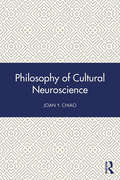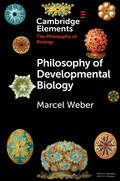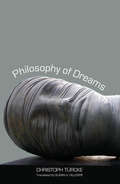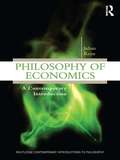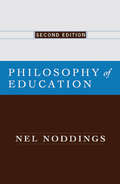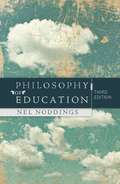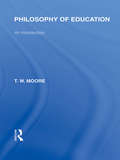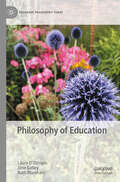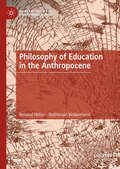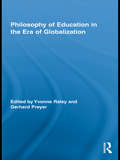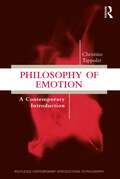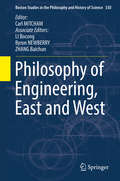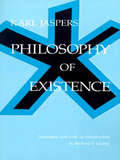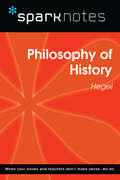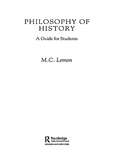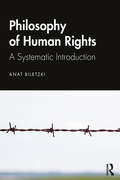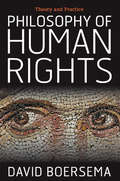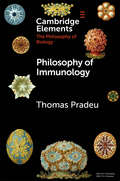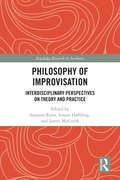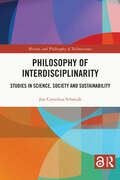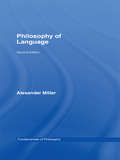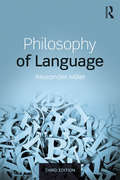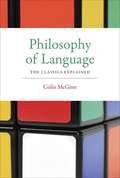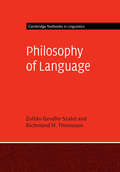- Table View
- List View
Philosophy of Cultural Neuroscience
by Joan Y. ChiaoThe goal of this volume is to highlight theoretical and methodological advances in cultural neuroscience and the implications of theoretical and empirical advances in cultural neuroscience for philosophy. The study of cultural and biological factors that contribute to human behavior has been an important inquiry for centuries, and recent advances in the field of cultural neuroscience allow for novel insights into how cultural and biological factors shape mind, brain and behavior. Theoretical and empirical advances in cultural neuroscience, which investigate the origins of culture, may shed light on philosophical issues of the mind and science.
Philosophy of Developmental Biology (Elements in the Philosophy of Biology)
by Marcel WeberThe history of developmental biology is interwoven with debates as to whether mechanistic explanations of development are possible or whether alternative explanatory principles or even vital forces need to be assumed. In particular, the demonstrated ability of embryonic cells to tune their developmental fate precisely to their relative position and the overall size of the embryo was once thought to be inexplicable in mechanistic terms. Taking a causal perspective, this Element examines to what extent and how developmental biology, having turned molecular about four decades ago, has been able to meet the vitalist challenge. It focuses not only on the nature of explanations but also on the usefulness of causal knowledge – including the knowledge of classical experimental embryology – for further scientific discovery. It also shows how this causal perspective allows us to understand the nature and significance of some key concepts, including organizer, signal and morphogen. This title is also available as Open Access on Cambridge Core.
Philosophy of Dreams
by Susan H. Gillespie Christoph TurckeWhy has humankind developed so differently from other animals? How and why did language, culture, religion, and the arts come into being? In this wide-ranging and ambitious essay, Christoph Türcke offers a new answer to these timeworn questions by scrutinizing the phenomenon of the dream, using it as a psychic fossil connecting us with our Stone Age ancestors. Provocatively, he argues that both civilization and mental processes are the results of a compulsion to repeat early traumas, one to which hallucination, imagination, mind, spirit, and God all developed in response. Until the beginning of the modern era, repetition was synonymous with de-escalation and calming down. Then, automatic machinery gave rise to a new type of repetition, whose effects are permanent alarm and distraction. The new global forces of distraction, Türcke argues, are producing a specific kind of stress that breaks down the barriers between dreams and waking consciousness. Türcke’s essay ends with a sobering indictment of this psychic deregulation and the social and economic deregulations that have accompanied it.
Philosophy of Economics: A Contemporary Introduction (Routledge Contemporary Introductions to Philosophy)
by Julian ReissPhilosophy of Economics: A Contemporary Introduction is the first systematic textbook in the philosophy of economics. It introduces the epistemological, metaphysical and ethical problems that arise in economics, and presents detailed discussions of the solutions that have been offered. Throughout, philosophical issues are illustrated by and analysed in the context of concrete cases drawn from contemporary economics, the history of economic ideas, and actual economic events. This demonstrates the relevance of philosophy of economics both for the science of economics and for the economy. This text will provide an excellent introduction to the philosophy of economics for students and interested general readers alike.
Philosophy of Education
by Nel NoddingsThe first edition of Nel Noddings' Philosophy of Education was acclaimed as the "best overview in the field" by the journal Teaching Philosophy and predicted to "become the standard textbook in philosophy of education" by Educational Theory. This classic text, originally designed to give the education student a comprehensive look at philosophical thought in relation to teaching, learning, research, and educational policy, has now been updated to reflect the most current thinking in the field. A revised chapter on Logic and Critical Thinking makes the topic more accessible to students and examines how critical thinking plays a role in light of the new Common Core standards. Philosophy of Education introduces students to the evolution of educational thought, from the founding fathers to contemporary theorists, with consideration of both analytic and continental traditions. This is an essential text not only for teachers and future teachers, but also for anyone needing a survey of contemporary trends in philosophy of education.
Philosophy of Education
by Nel NoddingsThe first edition of Nel Noddings’ Philosophy of Education was acclaimed as the "best overview in the field” by the journal Teaching Philosophy and predicted to become "the standard textbook in philosophy of education” by Educational Theory. This classic text, originally designed to give the education student a comprehensive look at philosophical thought in relation to teaching, learning, research, and educational policy, has now been updated to reflect the most current thinking in the field. Features of the third edition include a new chapter on multiculturalism and cosmopolitanism in education, as well as updates on the latest work in care ethics. Philosophy of Education introduces students to the evolution of educational thought, from the founding fathers to contemporary theorists, with consideration of both analytic and continental traditions. This is an essential text not only for teachers and future teachers, but also for anyone needing a survey of contemporary trends in philosophy of education.
Philosophy of Education (International Library of the Philosophy of Education Volume 14): An Introduction
by Terence W. MooreThis volume provides an introduction to the philosophy of education, which will enable students meeting the subject for the first time to find their way among the many specialized volumes. It deals in a non-technical way with the more important issues raised in a philosophical approach to education, and gives a clear idea of the scope of the subject. After discussing different theories of the aims of education, whether mechanistic or organic, the author addresses practical issues - for example, about the curriculum, the distinction between education and indoctrination, the role of authority and discipline, and the place of religious and moral teaching. Finally he deals with some important aspects of education and the influence of different political structures on the philosophy of education.
Philosophy of Education (Palgrave Philosophy Today)
by Laura D’Olimpio Jane Gatley Ruth WarehamThis textbook provides an up to date, accessible introduction to the philosophy of education with a focus on the conceptual and normative questions raised by educational policy and practice. The key concepts explored include learning, teaching, indoctrination, knowledge, equality, intelligence, virtue, and rights. Clarifying the meanings of these terms is vital for educators to be able to explain what they do and why. Such conceptual analysis helps us to address normative questions about what should or should not be done, educationally speaking. Each chapter firstly examines one key concept which is then connected to a theorised aim of education. The aims considered are rationality (i.e. critical thinking), knowledge, social justice, vocational preparation, flourishing, and political participation (citizenship). These aims of education are all hotly debated, so their strengths and weaknesses are considered. Each chapter concludes with a third section connecting the key concept and aim of education under discussion to an applied example. The applied examples include religious schools, attainment gaps in education, the educational impact of the coronavirus pandemic, the curriculum, teaching ethics in schools as a form of moral education, and citizenship education. These applied examples are drawn from vital social and political issues within education. By critically engaging with and then building upon extant literature, this book demonstrates how conceptual and normative issues within education have real world implications. At the end of each chapter, there are pedagogical resources designed to support teachers and students. These include a chapter summary, a list of recommended and further readings and online resources, as well as a list of study and research questions. This book is essential reading for all undergraduate and postgraduate students of the philosophy of education. It is also ideal for use on education theory courses and will be of interest to those studying philosophy or education.
Philosophy of Education in the Anthropocene (Palgrave Studies in Educational Futures)
by Renaud Hétier Nathanaël WallenhorstThis book develops a philosophy of education for the Anthropocene, proposing that we think about education in the light of contemporary bioclimatic challenges. Education is seen as the political means of choice for containing the runaway Earth system change and ensuring the sustainability of human life in society. In this book, Hétier and Wallenhorst continue their work on the biogeophysical and socio-political analysis of the Anthropocene here, tracing the path toward the re-founding of a political education to prepare students to address the greatest challenge of our time: the gradual disappearance of the bioclimatic conditions necessary for our very existence.
Philosophy of Education in the Era of Globalization (Routledge International Studies in the Philosophy of Education)
by Yvonne Raley Gerhard PreyerTerrorism, ethnocentrism, religious tension, competition over limited resources, war - these are just a few of the problems and challenges that have emerged in today's global economy. Globalization both implies and requires economic interdependence; and this should bring with it a heightened sense of the interconnectedness of the participating societies. But unfortunately, as recent events indicate, rather than our having formed a global community, today's society is more fragmented than ever. In light of this, education faces some formidable new challenges. How do we prepare future citizens for the world they will live in? How do we teach future generations to embrace the paradox of accepting the value of multiculturalism despite the conflicts it has produced? How do we instill religious tolerance in a time when fundamentalism has become inextricably tied with terrorism? How do we promote economic growth in the face of overpopulation and its depletion of resources? The authors of this collection of essays explore these and related challenges, and they suggest some novel ways of dealing with them.
Philosophy of Emotion: A Contemporary Introduction (Routledge Contemporary Introductions to Philosophy)
by Christine TappoletIn this book, Christine Tappolet offers readers a thorough, wide-ranging, and highly accessible introduction to the philosophy of emotions. It covers recent interdisciplinary debates on the nature of emotions as well as standard theories of emotions, such as feeling theories, motivational theories, and evaluative theories. The book includes discussions of the alleged irrationality of emotions, and looks into the question of whether emotions could not, in some cases, contribute positively to theoretical and practical rationality. In addition, the role of emotions in the theory of virtues and the theory of values receives a detailed treatment. Finally, the book turns to the question of how we can regulate and even educate our emotions by engaging with music and with narrative art. The overall picture of emotions that emerges is one that does justice to the central role that emotions play in our lives, conceiving of emotions as crucial to our grasp of values. As an opinionated introduction, the book doesn’t pretend to be neutral but aims to engage readers in contemporary debates. Each chapter closes with questions for further discussion and suggestions for further reading. Key Features: Written for advanced undergraduates, suitable as the main text in a philosophy of emotion course or as a complement to a set of primary readings. Includes useful features for student readers like introductions, study questions, and suggestions for further reading in each chapter. Considers whether emotions interfere with our reasoning or whether they can, in some cases, help us to be more rational. Argues against basic emotion theory and social constructionism that emotions are both shaped by biological forces and social forces. Discusses a variety of subjectivist and objectivist approaches, which share the assumption that emotions and values are closely connected.
Philosophy of Engineering, East and West
by Carl Mitcham Bocong Li Byron Newberry Baichun ZhangThis co-edited volume compares Chinese and Western experiences of engineering, technology, and development. In doing so, it builds a bridge between the East and West and advances a dialogue in the philosophy of engineering. Divided into three parts, the book starts with studies on epistemological and ontological issues, with a special focus on engineering design, creativity, management, feasibility, and sustainability. Part II considers relationships between the history and philosophy of engineering, and includes a general argument for the necessity of dialogue between history and philosophy. It continues with a general introduction to traditional Chinese attitudes toward engineering and technology, and philosophical case studies of the Chinese steel industry, railroads, and cybernetics in the Soviet Union. Part III focuses on engineering, ethics, and society, with chapters on engineering education and practice in China and the West. The book’s analyses of the interactions of science, engineering, ethics, politics, and policy in different societal contexts are of special interest. The volume as a whole marks a new stage in the emergence of the philosophy of engineering as a new regionalization of philosophy. This carefully edited interdisciplinary volume grew out of an international conference on the philosophy of engineering hosted by the University of the Chinese Academy of Sciences in Beijing. It includes 30 contributions by leading philosophers, social scientists, and engineers from Australia, China, Europe, and the United States.
Philosophy of Existence
by Karl Jaspers Richard F. GrabauPhilosophy of Existence was first presented to the public as a series of lectures invited by The German Academy of Frankfurt. In preparing these lectures Jaspers, whom the Nazis had already dismissed from his professorship at Heidelberg, knew that he was speaking in Germany for the last time. Jaspers used the occasion to offer an account of the cultural and intellectual situation from which existentialism emerged as well as a summary of his own philosophy.The book serves three purposes today: it brings the many strands of the existential movement into focus; it provides an overview of Jaspers's own philosophical position; and it demonstrates by example that philosophy need not be irrational, antiscientific, journalistic, or homiletic in order to be existential and engagé. In this short book Jaspers provides a corrective for the popular view of existentialism as a pessimistic, irrationalist philosophy. He maintains that it is, rather part of mainstream of Western philosophy--the form that philosophy has taken in our day.
Philosophy of History (SparkNotes Philosophy Guide)
by SparkNotesPhilosophy of History (SparkNotes Philosophy Guide) Making the reading experience fun! SparkNotes Philosophy Guides are one-stop guides to the great works of philosophy–masterpieces that stand at the foundations of Western thought. Inside each Philosophy Guide you&’ll find insightful overviews of great philosophical works of the Western world.
Philosophy of History: A Guide for Students
by M. C. LemonPhilosophy of History is an essential introduction to a vast body of writing about history, from classical Greece and Rome to the modern world. M.C. Lemon maps out key debates and central concepts of philosophy of history, placing principal thinkers in the context of their times and schools of thought. Lemon explains the crucial differences between speculative philosophy as an enquiry into the content of history, and analytic philosophy of history as relating to the methods of history. The first two parts of the book trace each of these traditions, whereas the third part revisits both in the light of recent contributions to the discipline. This guide provides a comprehensive survey of historical thought since ancient times. Its clear terminology and lucid argument will make it an invaluable source for students and teachers alike.
Philosophy of Human Rights: A Systematic Introduction
by Anat BiletzkiAn introductory text to the philosophy of human rights, this book provides an innovative, systematic study of the concepts, ideas, and theories of human rights. It examines the principal philosophical issues that arise in specific areas of rights, such as women’s rights, minority rights, or disability rights, and addresses the human rights aspects of world problems such as global poverty and humanitarian intervention. Along with the presentation of these established subjects, the book provides a vibrant critique of both the liberal fundamentals of human rights and the legal and political aspects of the concrete practice by individuals and organizations. Key Features: Presents a thorough philosophical introduction to human rights for anyone from any subject (e.g., international law, politics, public policy, philosophy). While grounded in philosophy, demonstrates a clear, organized understanding of real-world aspects of the field, with a deep analysis of vital, current issues. Is attentive to critical stances on human rights and to stultifying privations in the field. Offers a well-organized overall structure, moving from historical treatment, to conceptual analysis, to a set of current issues, and finally to criticism.
Philosophy of Human Rights: Theory and Practice
by David BoersemaCombining the sustained, coherent perspective of an authored text with diverse, authoritative primary readings, Philosophy of Human Rights provides the context and commentary students need to comprehend challenging rights concepts. Clear, accessible writing, thoughtful consideration of primary source documents, and practical, everyday examples pertinent to students' lives enhance this core textbook for courses on human rights and political philosophy. The first part of the book explores theoretical aspects, including the nature, justification, content, and scope of rights. With an emphasis on contemporary issues and debates, the second part applies these theories to practical issues such as political discourse, free expression, the right to privacy, children's rights, and victims' rights. The third part of the book features the crucial documents that are referred to throughout the book, including the Universal Declaration of Human Rights, the Convention on the Elimination of All Forms of Discrimination Against Women, the African Charter on Human Rights and Peoples' Rights, and many more.
Philosophy of Immunology (Elements in the Philosophy of Biology)
by Thomas PradeuImmunology is central to contemporary biology and medicine, but it also provides novel philosophical insights. Its most significant contribution to philosophy concerns the understanding of biological individuality: what a biological individual is, what makes it unique, how its boundaries are established and what ensures its identity through time. Immunology also offers answers to some of the most interesting philosophical questions. What is the definition of life? How are bodily systems delineated? How do the mind and the body interact? In this Element, Thomas Pradeu considers the ways in which immunology can shed light on these and other important philosophical issues. This title is also available as Open Access on Cambridge Core.
Philosophy of Improvisation: Interdisciplinary Perspectives on Theory and Practice (Routledge Research in Aesthetics)
by Susanne Ravn; Simon Høffding; James McGuirkThis volume brings together philosophical and interdisciplinary perspectives on improvisation. The contributions connect the theoretical dimensions of improvisation with different viewpoints on its practice in the arts and the classroom. The chapters address the phenomenon of improvisation in two related ways. On the one hand, they attend to the lived practices of improvisation both within and without the arts in order to explain the phenomenon. They also extend the scope of improvisational practices to include the role of improvisation in habit and in planned action, at both individual and collective levels. Drawing on recent work done in the philosophy of mind, they address questions such as whether improvisation is a single unified phenomenon or whether it entails different senses that can be discerned theoretically and practically. Finally, they ask after the special kind of improvisational expertise which characterizes musicians, dancers, and other practitioners, an expertise marked by the artist’s ability to participate competently in complex situations while deliberately relinquishing control. Philosophy of Improvisation will appeal to anyone with a strong interest in improvisation, to researchers working in philosophy, aesthetics, and pedagogy as well as practitioners involved in different kinds of music, dance, and theater performances.
Philosophy of Improvisation: Interdisciplinary Perspectives on Theory and Practice (Routledge Research in Aesthetics)
by Susanne Ravn; Simon Høffding; James McGuirkThis volume brings together philosophical and interdisciplinary perspectives on improvisation. The contributions connect the theoretical dimensions of improvisation with different viewpoints on its practice in the arts and the classroom. The chapters address the phenomenon of improvisation in two related ways. On the one hand, they attend to the lived practices of improvisation both within and without the arts in order to explain the phenomenon. They also extend the scope of improvisational practices to include the role of improvisation in habit and in planned action, at both individual and collective levels. Drawing on recent work done in the philosophy of mind, they address questions such as whether improvisation is a single unified phenomenon or whether it entails different senses that can be discerned theoretically and practically. Finally, they ask after the special kind of improvisational expertise which characterizes musicians, dancers, and other practitioners, an expertise marked by the artist’s ability to participate competently in complex situations while deliberately relinquishing control. Philosophy of Improvisation will appeal to anyone with a strong interest in improvisation, to researchers working in philosophy, aesthetics, and pedagogy as well as practitioners involved in different kinds of music, dance, and theater performances.
Philosophy of Interdisciplinarity: Studies in Science, Society and Sustainability (History and Philosophy of Technoscience)
by Jan Cornelius SchmidtInterdisciplinarity is a hallmark of contemporary knowledge production. This book introduces a Philosophy of Interdisciplinarity at the intersection of science, society and sustainability. In light of the ambivalence of the technosciences and the challenge of sustainable development in the Anthropocene, this engaged philosophy provides a novel critical perspective on interdisciplinarity in science policy and research practice. It draws upon the original spirit of interdisciplinarity as an environmentalist concept and advocates an essential change in human-nature relations. The author utilizes the rich tradition of philosophy for case study analysis and develops a framework to disentangle the various forms of inter- and transdisciplinarity. Philosophy of Interdisciplinarity offers a foundation for a critical-reflexive program of interdisciplinarity conducive to a sustainable future for our knowledge society and contributes to fields such as sustainability sciences, social ecology, environmental ethics, technology assessment, complex systems, philosophy of nature, and philosophy of science. It injects a fresh way of thinking on interdisciplinarity – and supports researchers as well as science policy makers, university managers, and academic administrators in critical-reflexive knowledge production for sustainable development.
Philosophy of Language
by Alex MillerThis engaging and accessible introduction to the philosophy of language provides an important guide to one of the liveliest and most challenging areas of study in philosophy. Interweaving the historical development of the subject with a thematic overview of the different approaches to meaning, the book provides students with the tools necessary to understand contemporary analytical philosophy. The second edition includes new material on: Chomsky, Wittgenstein and Davidson as well as new chapters on the causal theory of reference, possible worlds semantics and semantic externalism.
Philosophy of Language
by Alexander MillerPhilosophy of Language provides a comprehensive, meticulous survey of twentieth-century and contemporary philosophical theories of meaning. Interweaving the historical development of the subject with a thematic overview of the different approaches to meaning, the book provides students with the tools necessary to understand contemporary analytic philosophy. Beginning with a systematic look at Frege’s foundational theories on sense and reference, Alexander Miller goes on to offer a clear exposition of the development of subsequent arguments in the philosophy of language. Communicating a sense of active philosophical debate, the author confronts the views of the early theorists, taking in Frege, Russell, and logical positivism and going on to discuss the scepticism of Quine, Kripke, and Wittgenstein. The work of philosophers such as Davidson, Dummett, Searle, Fodor, McGinn, Wright, Grice, and Tarski is also examined in depth.The third edition has been fully revised for enhanced clarity and includes:· a short introduction for students, outlining the importance of the philosophy of language and the aims of the book;· two substantial new sections on Philip Pettit’s "ethocentric" account of rule-following and on Hannah Ginsborg’s "partial reductionism" about rule-following and meaning;· the addition of chapter summaries and study questions throughout, designed to promote greater understanding and engagement;· updated guides to further reading at the end of every chapter.This well-established and sophisticated introduction to the philosophy of language is an unrivalled guide to one of the liveliest and most challenging areas of philosophy and is suitable for use on undergraduate degrees and in postgraduate study.
Philosophy of Language
by Colin McginnMany beginning students in philosophy of language find themselves grappling with dense and difficult texts not easily understood by someone new to the field. This book offers an introduction to philosophy of language by explaining ten classic, often anthologized, texts. Accessible and thorough, written with a unique combination of informality and careful formulation, the book addresses sense and reference, proper names, definite descriptions, indexicals, the definition of truth, truth and meaning, and the nature of speaker meaning, as addressed by Frege, Kripke, Russell, Donnellan, Kaplan, Evans, Putnam, Tarski, Davidson, and Grice. The explanations aim to be as simple as possible without sacrificing accuracy; critical assessments are included with the exposition in order to stimulate further thought and discussion. Philosophy of Language will be an essential resource for undergraduates in a typical philosophy of language course or for graduate students with no background in the field. It can be used in conjunction with an anthology of classic texts, sparing the instructor much arduous exegesis. ContentsFrege on Sense and ReferenceKripke on NamesRussell on Definite DescriptionsDonnellan's DistinctionKaplan on DemonstrativesEvans on Understanding DemonstrativesPutnam on Semantic ExternalismTarski's Theory of TruthDavidson's Semantics for Natural LanguageGrice's Theory of Speaker Meaning
Philosophy of Language (Cambridge Textbooks in Linguistics)
by Zoltán Gendler Szabó Richmond H. ThomasonThis unique textbook introduces linguists to key issues in the philosophy of language. Accessible to students who have taken only a single course in linguistics, yet sophisticated enough to be used at the graduate level, the book provides an overview of the central issues in philosophy of language, a key topic in educating the next generation of researchers in semantics and pragmatics. Thoroughly grounded in contemporary linguistic theory, the book focus on the core foundational and philosophical issues in semantics and pragmatics, richly illustrated with historical case studies to show how linguistic questions are related to philosophical problems in areas such as metaphysics, epistemology, and ethics. Students are introduced in Part I to the issues at the core of semantics, including compositionality, reference and intentionality. Part II looks at pragmatics: context, conversational update, implicature and speech acts; whilst Part III discusses foundational questions about meaning. The book will encourage future collaboration and development between philosophy of language and linguistics.
